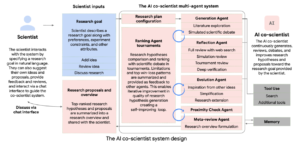Longevity in good health – How artificial intelligence will help extend our lives
Longevity in Good Health – How Each of Us Can Benefit from the Development of Artificial Intelligence for a Longer Life in Good Health
“The first person who will reach 150 years old has already been born.” – Aubrey de Grey
AI and the Medicine of the Future
Artificial intelligence (AI) is dynamically changing medicine, opening new possibilities in prevention, diagnostics, and the treatment of civilization diseases. The analysis of enormous amounts of medical data by AI can lead to breakthrough discoveries that might be difficult for the human eye to notice.
The current development of AI focuses on three key areas:
- Specialized AI Models – Tailored to specific fields of medicine.
- New Methods of Training AI – Enhancing the quality of analyses.
- Multi-model AI – Teams of algorithms collaborating to analyze data.
Specialized AI Models
One of the most advanced AI systems in medicine is Google’s Med-PaLM 2, designed for the analysis of medical data. Such models can precisely interpret test results and support doctors in diagnosing diseases.
See details: arxiv.org/pdf/2305.09617
New Methods of Training AI
The latest DeepSeek model, version 0, after its initial training, learns independently through inference, without relying on human-created inference models. The effectiveness of this approach surprised its creators, as the model achieved results comparable to traditional solutions.
Additionally, what might be called downright shocking was observing a sequence in which the model presented its reasoning and justified its answers. Surprisingly, the model started communicating in multiple languages—not always aligned with our perspective—but ultimately generating very good results.
See research: arxiv.org/abs/2501.12948
Multi-model AI – The Future of Medical Analysis
One of the most interesting approaches in AI is multi-model AI, where collaborating algorithms analyze data in teams. An example is Google’s AI co-scientist. Recently, this algorithm helped solve a decades-long mystery of superbugs in just 48 hours, demonstrating its potential to revolutionize research and accelerate scientific discoveries.
Professor José Penadés’s team at Imperial College London had, for years, investigated why some bacteria become resistant to antibiotics. The results of their work, conducted over many years, were never published, so the algorithm could not have known them. Yet, artificial intelligence independently generated a correct hypothesis. Moreover, it proposed four additional theories—all scientifically credible, including one that the researchers had never previously considered.
Learn more about AI co-scientist: research.google/blog
Multi-model AI at Medify.me
At medify.me, we use our own multi-model AI method to generate artificial intelligence reports. By employing AI models, we create a team of virtual doctors who collaborate to produce medical reports.
All data analyzed by the AI algorithm goes through a series of stages in which independent AI models are created to perform specifically defined tasks. This way, individual models have narrow, clearly defined goals, and each becomes a specialist in its assigned field. Additionally, the responses from these specialized models are verified and reconciled by subsequent independent models in a cooperative process—essentially a consultation or discussion among specialists aiming to correct potential errors and generate the best possible report.
The process consists of four stages:
- Assessment of Material Difficulty and Assignment of Specialists: One model assesses the difficulty of the material, and another assigns the most appropriate specialists for the given content.
- Creation of a Preliminary Report Based on Specialists’ Reports: Once the specialized models are assigned, each prepares a report from its domain, and another independent model compiles these into a preliminary report.
- Discussion/Voting on the Content of the Preliminary Report: If a model evaluating the preliminary report disagrees with its content, it votes NO and provides its justification along with a proposed change.
- Preparation of the Final Report: Based on the preliminary report and the evaluators’ agreements, the final report is prepared.
Thanks to this process, the reports are accurate, reliable, and easy to understand.
Will AI Surpass Human Intelligence?
Ray Kurzweil predicts that a technological singularity—a point when AI becomes smarter than humans—may soon occur. This could lead to breakthrough discoveries in medicine and rejuvenation therapies.
The concept of Longevity Escape Velocity (LEV), presented by Kurzweil and Aubrey de Grey, assumes that medical progress will extend our lives faster than our bodies age.
How to Prepare for the Future
As evidenced, the development of artificial intelligence is already dramatically accelerating research and discoveries in medicine. Ray Kurzweil predicts that in the coming years we may witness the discovery and implementation of therapies that not only prevent diseases but actually reverse the effects of some acquired, especially civilization-related, ailments.
It is not hard to imagine therapies that remove cholesterol deposits, regenerate cells, or repair faulty DNA transcription, among others.
Is it worth thinking about longevity now? Definitely yes! Here are the key steps:
- Regular Physical Activity: Movement is the foundation of longevity.
- Healthy Diet: Eat less, but better.
- Health Prevention: Regular check-ups allow early detection of diseases.
- Accumulation of Medical Data: A comprehensive health history helps AI tailor recommendations more effectively.
The development of AI may not only extend our lives but also improve its quality. Let’s prepare for the forthcoming health revolution!
🔎 Check out how www.medify.me can help you better manage your test results and take care of your health!
The content on our services is intended for informational and educational purposes and does not replace a medical consultation. Please consult a specialist before making any health decisions.
